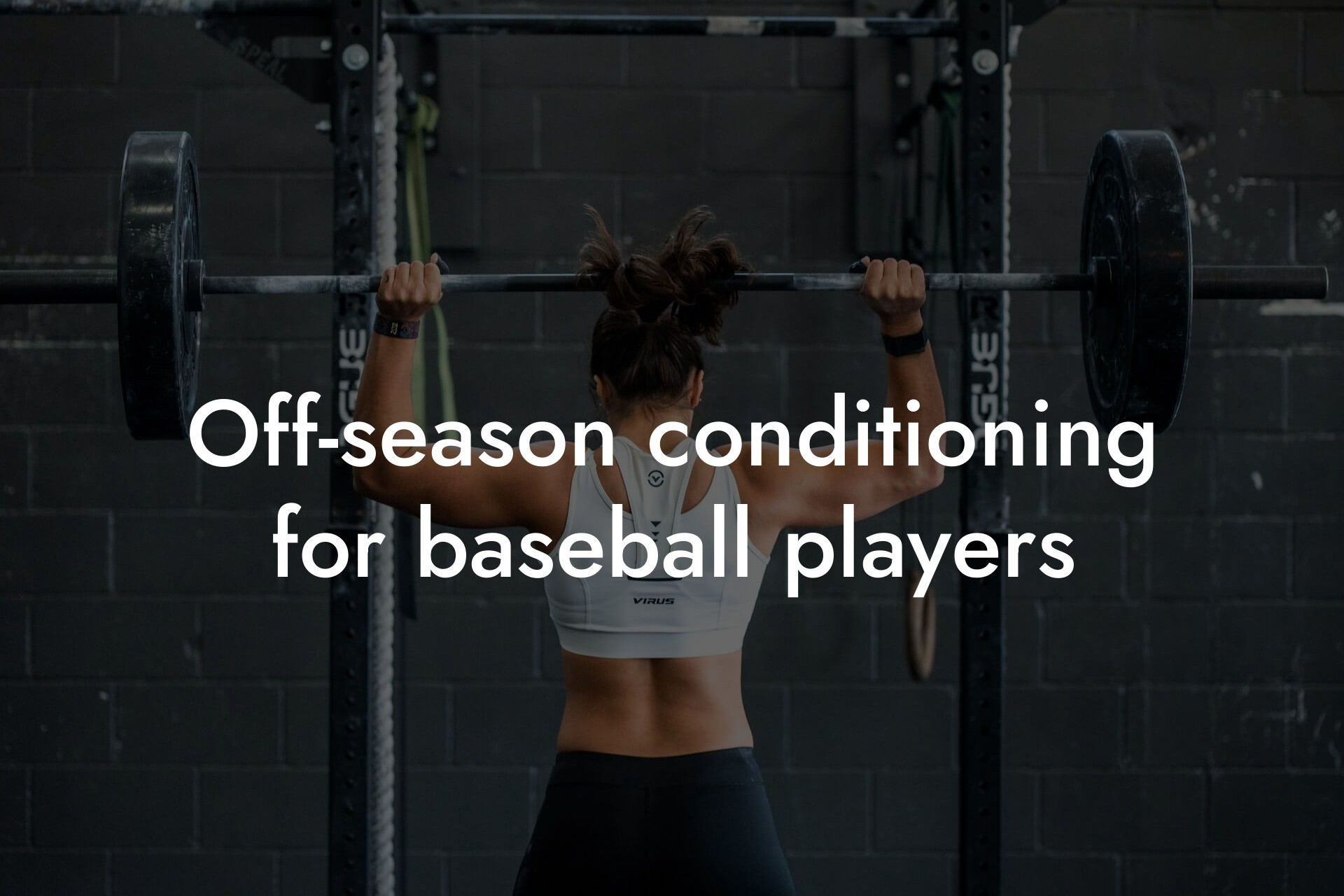As a baseball player, maintaining muscle mass is crucial for optimal performance on the field. During the season, it can be challenging to balance the demands of training, games, and travel with a nutrition plan that supports muscle growth and repair. However, with a well-planned nutrition strategy, you can ensure that you're fueling your body for success.
Table of Contents
- Understanding Muscle Loss During the Season
- Caloric Intake: Fueling for Performance
- Protein: The Building Block of Muscle
- Carbohydrates: Fuel for Performance
- Hydration: The Key to Optimal Performance
- Post-Game Nutrition: Recovery and Repair
- Supplementation: Supporting Muscle Growth and Repair
- Periodized Nutrition: Adjusting Your Plan Throughout the Season
- Frequently Asked Questions
Understanding Muscle Loss During the Season
During the baseball season, muscle loss can occur due to various factors, including inadequate nutrition, excessive energy expenditure, and inadequate recovery time. When you're not consuming enough protein and calories, your body may start to break down muscle tissue to use for energy, leading to muscle loss. Additionally, the physical demands of the game, such as sprinting, jumping, and throwing, can cause micro-tears in muscle fibers, which can lead to muscle damage and inflammation.
Caloric Intake: Fueling for Performance
To maintain muscle mass, it's essential to consume enough calories to support energy needs. Baseball players require a significant amount of energy to perform at their best, and inadequate caloric intake can lead to muscle loss. Aim to consume 2500-3000 calories per day, with a macronutrient breakdown of 25-30% protein, 40-50% carbohydrates, and 25-30% fat. Focus on whole, nutrient-dense foods such as lean proteins, complex carbohydrates, and healthy fats.
Protein: The Building Block of Muscle
Protein is essential for muscle growth and repair, and baseball players require a significant amount to support muscle function. Aim to consume 1.6-2.2 grams of protein per kilogram of body weight daily, spread out over 3-5 main meals and 2-3 snacks. Good sources of protein include lean meats, fish, eggs, dairy, and plant-based options like beans, lentils, and tofu.
Carbohydrates: Fuel for Performance
Carbohydrates provide energy for the body and are essential for optimal performance on the field. Focus on complex carbohydrates such as whole grains, fruits, and vegetables, which provide sustained energy and essential nutrients. Aim to consume 2-3 grams of carbohydrates per kilogram of body weight daily, with a focus on whole, unprocessed foods.
Hydration: The Key to Optimal Performance
Proper hydration is critical for athletic performance, and baseball players require adequate hydration to perform at their best. Aim to consume at least 8-10 glasses of water per day, and make sure to drink water during and after games and training sessions. Additionally, consider incorporating electrolyte-rich beverages like sports drinks to help replenish lost electrolytes.
Post-Game Nutrition: Recovery and Repair
After a game or intense training session, it's essential to consume a post-game meal or snack that provides the necessary nutrients for recovery and repair. Aim to consume a meal or snack that includes a mix of carbohydrates and protein within 30-60 minutes after exercise. Examples include a protein shake with fruit, a meal with grilled chicken and sweet potatoes, or a snack with Greek yogurt and berries.
Supplementation: Supporting Muscle Growth and Repair
In addition to a well-planned nutrition plan, certain supplements can help support muscle growth and repair. Consider incorporating the following supplements into your routine:
- Protein powder: a convenient way to increase protein intake
- Creatine: helps increase strength and power
- Branched-Chain Amino Acids (BCAAs): supports muscle growth and repair
- Omega-3 fatty acids: reduces inflammation and supports recovery
Periodized Nutrition: Adjusting Your Plan Throughout the Season
As the season progresses, your nutrition plan should adjust to meet the changing demands of the game. During periods of intense training or competition, you may need to increase caloric intake to support energy needs. Conversely, during periods of rest or recovery, you may need to decrease caloric intake to support weight loss or maintenance. Work with a sports dietitian or nutritionist to develop a periodized nutrition plan that meets your individual needs.
Frequently Asked Questions
What is the importance of nutrition for baseball players?
Nutrition plays a crucial role in a baseball player's performance and overall health. A well-planned diet provides the necessary energy, macronutrients, and micronutrients to support muscle growth, recovery, and optimal physical function. Adequate nutrition helps baseball players maintain their muscle mass, strength, and endurance throughout the season, reducing the risk of injuries and improving overall performance.
How does nutrition impact muscle maintenance during the baseball season?
Nutrition has a direct impact on muscle maintenance during the baseball season. A diet that provides adequate protein, carbohydrates, and healthy fats supports muscle growth and repair. Conversely, a diet that is deficient in these essential nutrients can lead to muscle loss, fatigue, and decreased performance.
What are the key nutrients for muscle maintenance during the baseball season?
The key nutrients for muscle maintenance during the baseball season are protein, carbohydrates, and healthy fats. Protein is essential for muscle growth and repair, while carbohydrates provide energy for high-intensity activities. Healthy fats support hormone production and overall health.
How much protein do baseball players need to consume daily?
Baseball players require a daily protein intake of 1.6-2.2 grams per kilogram of body weight to support muscle growth and repair. For example, a 180-pound baseball player would need to consume 120-150 grams of protein per day.
What are the best sources of protein for baseball players?
The best sources of protein for baseball players include lean meats like chicken, turkey, and fish, as well as plant-based options like beans, lentils, and tofu. Dairy products, eggs, and protein shakes can also provide additional protein.
How many carbohydrates do baseball players need to consume daily?
Baseball players require a daily carbohydrate intake of 2-3 grams per kilogram of body weight to provide energy for high-intensity activities. For example, a 180-pound baseball player would need to consume 160-240 grams of carbohydrates per day.
What are the best sources of carbohydrates for baseball players?
The best sources of carbohydrates for baseball players include complex carbohydrates like whole grains, fruits, and vegetables, as well as simple carbohydrates like sports drinks and energy bars.
How much healthy fat do baseball players need to consume daily?
Baseball players require a daily healthy fat intake of 0.5-1 gram per kilogram of body weight to support hormone production and overall health. For example, a 180-pound baseball player would need to consume 40-80 grams of healthy fat per day.
What are the best sources of healthy fats for baseball players?
The best sources of healthy fats for baseball players include nuts, seeds, avocados, and olive oil.
How often should baseball players eat during the day?
Baseball players should aim to eat 4-6 meals per day, spaced out every 2-3 hours, to maintain energy levels and support muscle growth and repair.
What should baseball players eat before a game?
Baseball players should eat a balanced meal that includes protein, carbohydrates, and healthy fats 1-2 hours before a game. Examples include a turkey sandwich on whole grain bread with avocado, or a bowl of oatmeal with banana and almond butter.
What should baseball players eat during a game?
Baseball players should consume light, easy-to-digest snacks during a game, such as energy bars, fruit, or sports drinks, to maintain energy levels and prevent dehydration.
What should baseball players eat after a game?
Baseball players should eat a meal that includes protein and carbohydrates within 30-60 minutes after a game to support muscle recovery and repair. Examples include a protein shake with banana, or a meal of grilled chicken with sweet potatoes.
How can baseball players stay hydrated during the season?
Baseball players can stay hydrated by drinking at least 8-10 glasses of water per day, and consuming sports drinks during and after games to replenish lost electrolytes.
What are the signs of dehydration in baseball players?
The signs of dehydration in baseball players include dark yellow or brown urine, dry mouth, fatigue, dizziness, and headaches.
How can baseball players reduce muscle soreness during the season?
Baseball players can reduce muscle soreness by consuming anti-inflammatory foods like omega-3 fatty acids, turmeric, and ginger, as well as using recovery techniques like foam rolling and stretching.
What are the benefits of post-game stretching for baseball players?
Post-game stretching can help baseball players reduce muscle soreness, improve flexibility, and enhance recovery.
How can baseball players maintain their weight during the season?
Baseball players can maintain their weight by consuming a balanced diet that includes protein, carbohydrates, and healthy fats, and by staying hydrated. Avoiding excessive calorie intake and focusing on nutrient-dense foods can also help.
What are the risks of rapid weight loss for baseball players?
The risks of rapid weight loss for baseball players include muscle loss, decreased strength and endurance, and increased risk of injury.
How can baseball players support their immune system during the season?
Baseball players can support their immune system by consuming a diet rich in fruits, vegetables, and whole grains, as well as staying hydrated and getting adequate sleep.
What are the benefits of probiotics for baseball players?
Probiotics can help baseball players support their immune system, reduce inflammation, and improve digestion.
How can baseball players reduce inflammation during the season?
Baseball players can reduce inflammation by consuming anti-inflammatory foods like omega-3 fatty acids, turmeric, and ginger, as well as using recovery techniques like foam rolling and stretching.
What are the benefits of nutrition planning for baseball players?
Nutrition planning can help baseball players optimize their performance, reduce the risk of injury, and improve their overall health and well-being.
How can baseball players work with a sports dietitian to develop a personalized nutrition plan?
Baseball players can work with a sports dietitian to develop a personalized nutrition plan by scheduling a consultation, providing information about their dietary needs and goals, and working together to create a customized plan.
Here are some related articles you might love...
- How DEXA scans can help baseball players optimize performance
- Recovery strategies for baseball athletes
- Off-season conditioning for baseball players
- Strength training programs for baseball athletes
- Reducing body fat for better speed on the bases
- Balancing muscle mass and flexibility in baseball
- The importance of core strength in baseball performance
- The role of body composition in baseball power and endurance
- Bone density and its impact on injury prevention in baseball
Zak Faulkner
Zak Faulkner is a leading authority in the realm of physical health and body composition analysis, with over 15 years of experience helping professionals optimise their fitness and well-being. As one the experts behind Tano Performance Group, Zak has dedicated his career to providing in-depth, science-backed insights that empower clients to elevate their physical performance and overall health.
With extensive knowledge of DEXA technology, Zak specializes in delivering comprehensive body assessments that offer precise data on body fat, muscle mass, bone density, and overall physique. His expertise enables individuals to make informed decisions and achieve their fitness goals with accuracy and confidence. Zak’s approach is rooted in a deep understanding of human physiology, combined with a passion for helping clients unlock their full potential through personalised strategies.
Over the years, Zak has earned a reputation for his commitment to excellence, precision, and client-focused service. His guidance is trusted by top professionals who demand the best when it comes to their health. Whether advising on fitness programs, nutritional strategies, or long-term wellness plans, Zak Faulkner’s insights are a valuable resource for anyone serious about taking their health and fitness to the next level.
At Tano Performance Group, Zak continues to lead our Content Team revolutionising how professionals approach their physical health, offering unparalleled expertise that drives real results.




